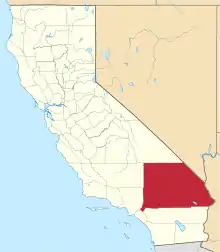Seven Oaks, California | |
|---|---|
 Seven Oaks, California Location within the state of California  Seven Oaks, California Seven Oaks, California (the United States) | |
| Coordinates: 34°11′11″N 116°54′51″W / 34.18639°N 116.91417°W | |
| Country | United States |
| State | California |
| County | San Bernardino |
| Elevation | 5,305 ft (1,617 m) |
| Population (2000) | |
| • Total | 289 |
| Time zone | UTC-8 (Pacific (PST)) |
| • Summer (DST) | UTC-7 (PDT) |
| ZIP code | 92305 |
| GNIS feature ID | 1661426[1] |
Seven Oaks is an unincorporated mountain community in the San Bernardino Mountains. It sits by the Santa Ana River, 7 miles northeast of Angelus Oaks. Seven Oaks Road leads to the neighboring community of Pinezanita, 3.5 miles west of Seven Oaks. It is located 4 miles off Highway 38.[2] It is a resort community[3] which was founded in 1845.
Seven Oaks is situated in the Santa Ana River Canyon, roughly halfway between the confluence of Bear Creek and the Santa Ana to the west, and the headwaters of the Santa Ana below Sugarloaf Mountain to the east.[4] It sits four miles from the Highway 38, and may be reached from Glass Road, Forest Road and Seven Oaks Road. It is located next to Santa Ana River, a river which is popular for Trout and German Brown fishing.[5]
It was named for the English town Sevenoaks, Kent by Charles M. Lewis in 1845. It was previously a sheep ranch, but developed into a resort community after the opening of Big Bear Lake, California. The community is now home to a lodge which dates back to 1876, and is also home to a bar, duck pond, restaurant and gift shop. It is also home to a swimming pool and numerous hiking trails to Barton Flats and nearby mountain destinations. It has been named the oldest resort town in Southern California.[6]
Films such as The Girl Who Ran Wild (1922) and The Savage (1917) have been filmed in Seven Oaks.[7]
A cabin burned down and a shootout took place here during the manhunt for officer Christopher Dorner in February 2013.[8][9][10]
History
Seven Oaks was established as a resort town in the late 1800s, located halfway up the San Bernardino’s to Big Bear. It was a frequent stop for burro riders using the burro trains up and down the Big Bear Valley Trail, developed by the Big Bear Valley Toll Road Company in 1888.[11] Big Bear had become a popular tourist destination by 1900, and many travelers made a stop in Seven Oaks on the two-day journey up the San Bernardino Mountains. Seven Oaks was originally founded as a homesteading community by hunter Charles Matthew Lewis in 1875. He later established the Lewis Resort here which included 15 rental cabins, a restaurant and a post office in the 1890s. The resort was later sold to William Glass, who moved here with his wife Serena in 1912. The Glass family ran the resort until the 1960s.[12]
References
- ↑ "Domestic Names".
- ↑ "Big Bear Grizzly High School Sports | Big Bear Grizzly".
- ↑ Harris, David M. and Jennifer M. (2010). Afoot and Afield: Inland Empire: A Comprehensive Hiking Guide. Wilderness Press. Page 127. 9780899975351.
- ↑ Tangney, ShaunAnne (2015). The Wild That Attracts Us: New Critical Essays on Robinson Jeffers. UNM Press. Page 199. ISBN 9780826355782.
- ↑ Summons, Trevor (2016). Trevor's Travels in Southern California. iUniverse. Page 17. ISBN 9781491785836.
- ↑ Summons, Trevor (2016). Trevor's Travels in Southern California. iUniverse. Pages 17-18. ISBN 9781491785836.
- ↑ Cozad, W. Lee (2006). More Magnificent Mountain Movies. Sunstoke Media. Page 364. ISBN 9780972337236.
- ↑ "Report: Dorner's wallet found in burned-out cabin". USA Today.
- ↑ "Cabin where rogue ex-LAPD cop was holed up not intentionally burned down, sheriff says". Fox News. March 25, 2015.
- ↑ "Ex-Los Angeles cop barricaded in California cabin - UPDATE". February 13, 2013.
- ↑ "Big Bear Historical Timeline – Part 2 | Big Bear History Site".
- ↑ "Big Bear Grizzly High School Sports | Big Bear Grizzly".
